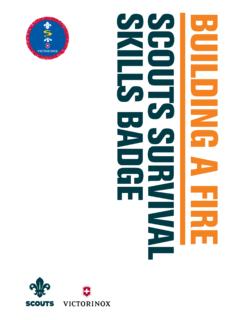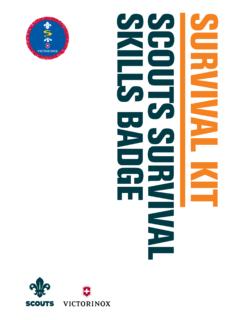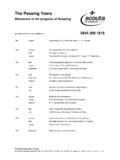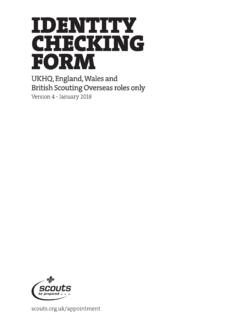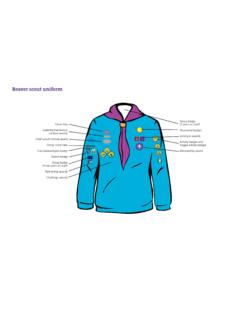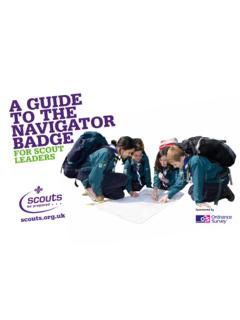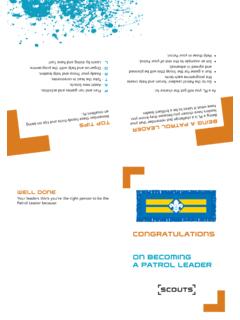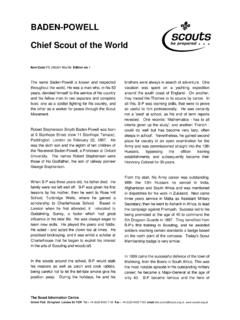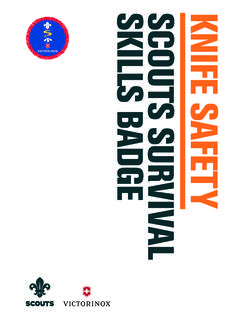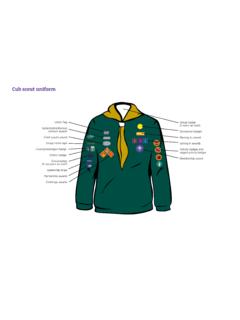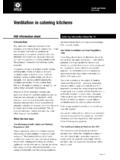Transcription of Gas - Scouts
1 introduction The purpose of this fact sheet is to provide best practice advice to Scouts when using LPG. Advice particularly for gas has been taken from different recognised agencies such as the UKLPG Association websites and booklets and also Camping and Caravanning Club sites. There is not always only one solution and the key to determining the safest solutions for individual camping arrangements, will remain as the risk assessment process. Many of the UK H&S legislative standards apply to workplaces and the one key standard relevant to camping fuels will be the relevant fire safety standards. Gas Which gas should I use, Propane or Butane? The physical properties of the two gases are similar, and when regulated to the correct pressure, they will perform almost identically.
2 However there are some important differences. Of the two gases, Butane has the most advantages. Litre for litre, it contains around 12% more energy than Propane and so you can squeeze more running time into the same sized bottle. (Butane is heavier than Propane though, so weight for weight it's a pretty close call.) Butane also burns cleaner than Propane and although this isn't normally a serious issue in camping it might be a consideration on the maintenance of gas equipment in the long term. Finally, while it's not strictly a property of the gas, Butane cylinders generally but not always, use clip-on type connections. These are far more convenient than the Propane screw type connections, especially if you swap cylinders around regularly Conversely, Propane has only one advantage over Butane - but it's a big one!
3 It is more effective than butane when the temperature is lower so might be better during activities during the colder months. In order to be usable, the liquid in the bottle must be able to boil into a gas. In the case of Butane, this will happen at any temperature above -2C, whereas with Propane, this figure is much lower, at -42C. In the real world, it's not so clear cut. Whenever some of the liquid boils into gas, the remaining liquid cools. It is therefore possible for the temperature of the liquid to drop to several degrees below ambient. This can easily prevent a Butane canister from producing a useful gas supply, even when the outside temperature is several degrees above 0C. So choosing the right gas pretty much boils down to whether you need to use it in freezing (or near freezing) conditions.
4 If this is likely, then Propane is a must. If not, then Butane has the edge. 2 Similarities Both gases burn clearly and have a high calorific value, giving similar flame shapes and heat outputs, and in principle, appliances will burn equally well off either gas. Differences However, as gas is drawn off from the cylinder and liquid turns back into gas, the liquid cools down causing the rate of change from liquid to gas to slow down. This effect is particularly marked for butane which will not turn from liquid to a gas below 0 oC, so that on cold days or when the gas is being withdrawn at a high rate, the liquid gets so cold that it delivers very low amounts of gas, or indeed no gas at all. Thus butane tends to be used for low pressure domestic appliances indoors, or outdoors in the summer only.
5 Propane continues to turn from liquid to gas at much low temperatures than butane and thus gives a high pressure of gas on the coldest of days. Although propane cylinders can be used indoors on a temporary basis, they should not be stored indoors because of the higher pressures in them. Equipment The owner / user of all LPG appliances and equipment is responsible to ensure that all their kit has been especially designed for use with LPG and thus ensure they can give long and reliable service to the user provided they are correctly operated and maintained. It is essential that sensible safety precautions be followed with any appliances using butane and propane gases which are considerably heavier than air and highly inflammable; and because of these facts, we list here simple safety measures which should always be adopted when using the appliances.
6 Failure to observe these could result in a serious accident. It is very important that whoever is going to use the equipment know how to operate it and never allow anyone other than a competent person (someone with a good level of experience) to connect or disconnect appliances and regulators. You might need to be trained in this by a technically competent person. Appliances With new appliances, read the instructions provided with the appliance, taking particular care to ensure that the gas type is correct and the supply can provide sufficient gas for the appliance and any other appliances drawing on the same supply. Ensure that the regulator provides gas at the correct pressure for your application; Site the appliance so that it cannot overheat any surfaces and cannot cause an accident; Ensure the table you use for cooking burners has a heat resistant cover or surface such as thin metal plate; Set up away from mess tent / dining shelter sides as far as reasonably practicable.
7 For older equipment, ensure that the appliance has an adapter and regulator already attached for the type of gas bottle you are going to use. If the equipment does not have the connector on, do not guess 3 at the type required; get advice from a manufacturer or supplier. Do not change the connector or regulator unless the appliance should burn cleanly without the formation of soot. If it does not, turn it off and ensure the maintenance is carried out by a competent person before re-using. Most appliances operate at high pressures ( in the range to 2 bar) since this gives the hot compact flames required for lights and portable heating equipment. Ventilation Fixed installations: All LPG equipment consumes oxygen and emits carbon dioxide in use so that when using un-flued equipment in an enclosed space it is important that there is adequate permanent ventilation and adequate free space surrounding it.
8 These requirements are laid down in various British Standard Codes of Practice. When using appliances in mess tents, party type tents or marquees, there must be open doors and the ventilation meshes must be open at all times the equipment is connected up to the cylinder. Gases are heavier than air and closed tentage in the case of gas leaks would entrap a layer of gas at low level. (See section on Carbon Monoxide poisoning at the end of the guidance note). Cylinders Make sure the cylinder is large enough for your requirements. Cylinders must be sited away from any heat source, in a well-ventilated place and must stand in a stable upright position. Never put a cylinder in a below ground level area such as ditch, as LPG is heavier than air and any leak will allow gas to pool and become a greater risk from naked Cylinders should be placed upright and outside the confines of the cooking tentage so the cylinder valve is more accessible in the event of a fire.
9 Bottles should not be kept under a cooking table as should a fire start, you cannot get to the bottle to turn off the supply without going under the fire itself. If required, a suitable lightweight weather cover can be used to protect bigger cylinders ( Propane) against excessive wet weather or the heat of the midday sun if this is deemed a risk factor. 4 Regulators Regulators change the pressure of the gas so that the pressure of the gas arrives at the equipment is at a suitable level for it to use. Regulators must be marked BS3016 or BS EN12864 Appliances should only be used in conjunction with a British Standard regulator. It is important to check that the regulator: 1. Gives the correct pressure for the appliance; 2. is suitable for the gas being used (check also that the gas is suitable for the appliance); 3.
10 Has a large enough maximum flow for the appliance. For propane cylinders, and for butane cylinders having screwed connectors: 1. Always, before connecting a regulator to a cylinder, ensure that the mating parts are clean, free from dirt and undamaged, and, in the case of butane regulators, check that the washer is in place on the spigot of the connector and is in good condition; 2. The connecting nut of the regulator must be hand force spanner tightened to the cylinder valve. (Note: The thread is left-handed.) Do not over tighten. For butane cylinders with switch-on or clip-on connectors: Consult your dealer on the type of adaptor or regulator you require and fit in accordance with the manufacturer s instructions Screwed connections Note that all nuts with notches on the hexagon have a left-handed thread.
